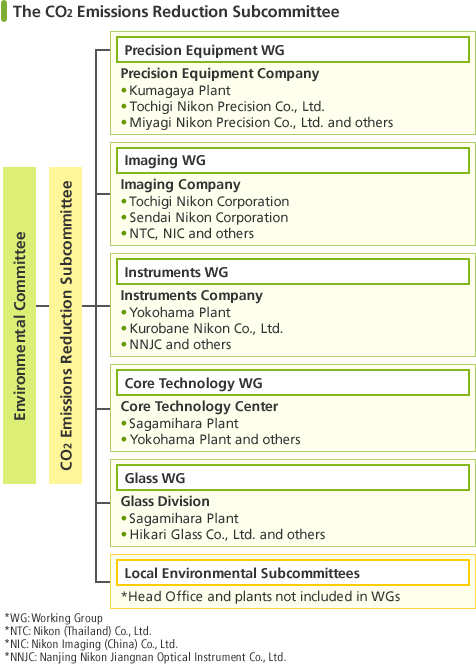The Nikon Basic Environmental Management Policy
The Nikon Group created the Nikon Basic Environmental Management Policy, which aims to prevent environmental pollution by using resources efficiently and helping to preserve the global environment so that it would be able to pass on a sustainable and healthy environment to further generations. Following are the action guidelines that form the framework for this policy.
- The Nikon Basic Environmental Management Policy
-
- Basic Philosophy
One of the priorities of Nikon (Nikon Corporation and the Nikon Group) is to foster coexistence and co-prosperity in all regions where its business operates across the world, everywhere on Earth, and even in space. This policy is based on the corporate philosophy of Nikon, "Trustworthiness and Creativity." In all our business activities we are committed to combating environmental pollution, making effective use of resources, and contributing to building a recycling-based society, thereby protecting and improving the global environment and passing it on to future generations for the sustainable development of society.
- Basic Approach
As a responsible company, Nikon is committed to protecting the global environment and to monitoring its impact on the natural environment, including issues related to climate change and biodiversity. Our commitment is based on the recognition that if companies are to continue to develop, it is essential to solve environmental problems, because in the end this will contribute to the survival of humankind.
We will win the trust and support of society by providing high-quality products that are both people-and earthfriendly, and we will introduce activities across Nikon and at our business partners to achieve this. - Action Guidelines
- We will make every effort to promote reductions of CO2 and waste emissions, reuse and recycling, while encouraging energy and resource conservation, waste reduction and conscientious waste processing with the goal of creating an environmentally-conscious recycling society.
- We will perform environmental and safety reviews, including those to conserve biodiversity, at every stage of planning, development and design, in order to provide products that fully comply with environmental protection aims.
- At every stage of production, distribution, use and disposal, we will actively introduce materials and equipment that are effective in protecting the environment, including conservation of biodiversity, strive to develop and improve technologies in this area, and work to minimize environmental burdens.
- We will meet targets for reduction of our environmental burdens and use of harmful substances, and continue to improve our environmental management system through environmental audits and other means.
- We will develop and follow a rigorous code of standards, in addition to observing all environmental conservation treaties, national and regional laws and regulations.
- We will conduct ongoing education programs to further employee knowledge of environmental issues and promote employee involvement in environmental activities.
- We will provide business partners with guidance and information to promote optimal environmental protection activities.
- In cooperation with our stakeholders, we will participate actively in the environmental protection programs of society at large, and actively disclose information.
- Basic Philosophy
Nikon Environment Symbol

For its environmental protection and improvement activities, the Nikon Group created the Nikon Environment Symbol in 1998.
Nikon's approach to biodiversity
Corporate activities are closely related to biodiversity.
While we conduct our corporate activities using nature's blessings, including materials, water, and energy, we impact nature both directly and indirectly by generating waste, emitting CO2, and releasing chemical substances and wastewater.
Nikon Corporation has become a promotion partner in the Declaration of Biodiversity by Nippon Keidanren and revised the Nikon Basic Environmental Management Policy to clearly show its basic approach to biodiversity. We are also engaged in a range of environmental conservation activities to reduce CO2 emissions, curtail the use of hazardous chemical substances to comply with the RoHS Directive* and others, and minimize the generation of waste to achieve zero emissions*, including joining and giving support to the AKAYA Project and the Mt. Fuji Reforestation Project.
We continue to identify what impact our business activities have on biodiversity and enhance our resource recycling-oriented management, cooperate with stakeholders, disseminate the relevant information, and educate employees to protect the natural environment.
- Social Contribution Activities: Supporting the AKAYA Project in Japan
- Social Contribution Activities: Participating in the Mt. Fuji Reforestation Project
- *RoHS Directive
"RoHS" stands for "Restriction of Hazardous Substances." This directive was adopted by the EU in 2003. It restricts the use of certain hazardous chemical substances in electrical and electronic equipment with a view to minimizing the risks that these substances pose to the environment and human health.
- *Zero emissions
A concept proposed by the United Nations University in 1994 with a view to reducing waste from the whole of society to zero by recycling waste from one industry for use as resources for other industries.
Efforts in Biodiversity Conservation
Led by a working group consisting of members from the CSR section, Social Contribution section, Environmental section and Procurement section, the Nikon Group has been exploring initiatives aimed at preserving biodiversity.
During the year ended March 31, 2012, we strengthened our monitoring of environmental data, and using the Corporate Ecosystem Services Review (ESR)*, we assessed which benefits or "ecosystem services" our corporate activities were relying on or affecting by way of our facilities and/or products. During the year ending March 31, 2013, based on the results of the ESR and of our own impact assessments, we will implement specific measures that reflect the true Nikon.
- *Corporate Ecosystem Services Review (ESR)
A methodology published by the World Business Council for Sustainable Development (WBCSD) for companies to identify their own dependence and impact
Promoting the reduction of CO2 emissions

The Nikon Group is making efforts to reduce CO2 emissions, centered on the CO2 Emissions Reduction Subcommittee comprised of working groups from in-house companies and business segments that emit large amounts of CO2.
In addition to activities carried out independently by facilities, the Nikon Group has created systems for independent activities on the part of its in-house companies and business segments. These systems involve considering, drafting, and implementing effective measures to reduce CO2 emissions that are in line with each business form.
The Nikon Group is working to reduce CO2 emissions, keeping an eye on the evolvement of the Japanese government's energy policy and power companies' reactions after the Great East Japan Earthquake, and bearing in mind how international frameworks are forming. Under the management of the CO2 Emissions Reduction Subcommittee, each unit and facility have established their own reduction targets and are implementing various measures to reduce CO2 emissions. In addition to each department promoting their own autonomous activities, such as visualization of energy usage, extending this to management by objectives and awareness-raising activities for employees, we are carrying out initiatives throughout entire product life cycles.
Especially in Japan, considering how tight the current power supply situation is, the Nikon Group is inspecting its ordinary energy usage once again and working toward even more thorough energy conservation, including electricity savings.
